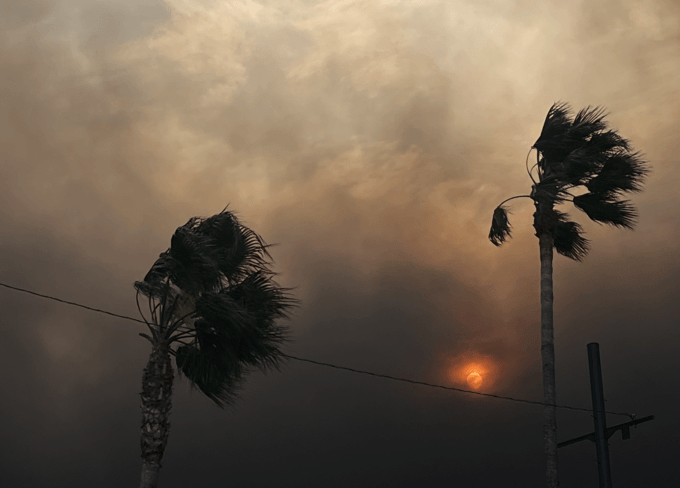by JOSHUA FRANK

“L.A. is vast. It is a city and a county. It is a global place, a Pacific Rim space, a ‘Third World’ metropolis. It has all the contradictions of the world and all the world is condensed in it. The homes of rich, poor, middle class, Black, white, Asian, Latino have burned. Fire is coming for all of us.” – Viet Thanh Nguyen
As I sit at my desk to write, the light shining through my office window is a distinct orange, and the sky outside is a murky, polluted shade of brown. The air quality is horrendous, and my eyes are dry and itchy. My throat is sore. Two major fires are still raging out of control in Los Angeles, the city I love, with little to no containment. Another has just erupted in Woodland Hills. Fortunately, we’re in a safe zone away from the infernos. Many more are not so lucky.
Scrolling through the latest fire updates on social media, I quickly find commenters who are cheering on the flames as if they’ve been ignited to smoke out the wealthy elites from their mansions. They are gleeful. Conspiracists I come across believe this is all a planned land grab (by whom I’m unsure), while others spread lies that the shadowy Deep State, the ones behind weather-altering chemtrails, is somehow responsible.
I gather that most of these folks don’t live in Los Angeles (or the real world?), and I’m sure very few could point out the location of Eagle Rock on a map. Yet, here they are, experts on fire ecology and the history of Los Angeles.
I see, as per usual during a big L.A. fire, that a few are passing around Mike Davis’s fantastic essay, “The Case for Letting Malibu Burn,” not because of Davis’s thesis that the poor, by capitalist design, suffer most during a natural disaster but because they seem to believe he was some kind of schadenfreude. It’s a shameful disservice to his legacy and a twisted misreading of Davis’s important work.
A fervent critic of the conditions that lead to inequality, Mike Davis was not one to celebrate misery. He would have had nothing but empathy for those impacted by these flames (okay, maybe not James Wood). As I think about Mike, his daughter Róisín messages me. Her childhood home and school have burned to the ground.
Another friend posts a short video of a smoldering foundation, remnants of his garage/art studio. He’s lost everything, years of work. His family was lucky to escape. A GoFundMe pops up; a friend of a friend needs help. The place they rent is gone.
I get it, though. Many people do not empathize with Los Angeles or those of us who live here, even though L.A. is one of the country’s most culturally significant, diverse, and fascinating cities. It’s become a natural reaction to hate this place. The city has been relentlessly portrayed in the media, magazines, film, and television as vapid – a bastion of rich, self-obsessed Hollywood liberals, freeways, and smog. It’s an easy city to despise if you are afraid of what you do not know, and no single person knows everything about Los Angeles.
L.A. is endlessly complicated, and the reality of what’s behind these fires, which will forever reshape its battered landscape and charred souls, is no different.
The totality of the destruction of these flames is impossible to comprehend. They’ve consumed museums, schools, mobile home parks, senior centers, stores, restaurants, encampments, apartment buildings, fire stations, countless homes, and many historical and cultural landmarks. It’s hard to keep track. Tens of thousands of people have been displaced. The historic Black community of Altadena has been decimated. People have died, animals have suffocated, and families across the economic spectrum have lost everything.
Counterpunch for more
